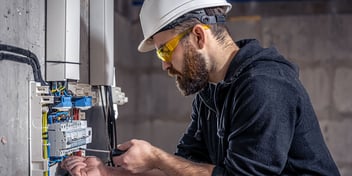
Everything Senior Care Owners Need to Know About Business Loans
Owning a small business, such as an assisted living facility, is undoubtedly a lot of work. Aside from the typical day-to-day tasks, there are always new challenges and obstacles to overcome.
When it comes to expanding your small business, financing can be one of the biggest hurdles you can face. Luckily, there are several types of business loans available in your industry.
This blog post will discuss the different assisted living facility loans available to senior care small business owners. So if you’re thinking about taking out a loan to grow your senior housing facility, read on!
Why Do You Need an Assisted Living Facility Loan?
An assisted-living facility is considered commercial real estate since it produces income. It includes group homes, nursing homes, continuing care communities, and memory care centers.
Running an assisted living facility is no joke. Operating costs can hinder the majority of assisted living facilities looking forward to expanding their business.
Loan programs can help you take care of the following costs:
- Purchasing equipment and supplies for staff and residents
- Interior renovation/ redecoration of rooms
- Construction of a new facility
- Hiring new employees and training skilled nursing staff
You may be able to wait it out until you have enough funds to pay for these expenses, but waiting will only hold back your business’ growth.
By taking out a senior care business loan, you’ll be able to access the money for your business needs whenever you need it. This will allow you to keep other aspects of your senior care facility running smoothly and worry less about where the next paycheck is coming from.
9 Best Loans for Assisted Living Facilities in 2022
If you go to Google and type loan programs for senior care homes, you can get millions of results in a second. Searching for the exact loan you need can be daunting if you’re unaware of what kind of loan suits best for your assisted living facility financing.
We’ve compiled the following list of the top 9 most suitable loans for assisted living homes in 2022 to help you find exactly what you need.
1. Fannie Mae Senior Housing Loan
This program provides mortgages for existing, stabilized properties that offer independent living and assisted living Alzheimer’s/Dementia care.
Here are the terms of the loan:
- Loan sizes above $2 million
- Up to 75% loan-to-value (LTV)
- Fixed-rate terms that go up to 30 years
- Non-recourse and assumable
- Available for more experienced operators
2. The Freddie Mac Multi-Family Loan Program
The Freddie Mac Multi-Family Loan Program is a great option for senior housing loans from 1 million to 7.5 million dollars. You can take advantage of competitive rates and non-recourse debt without having to worry about yield maintenance or paying off your loan at maturity.
With this loan program, you can maximize your property’s cash flow with low interest-only payments over 30 years, as well as no replacement reserves.
More terms associated with the Freddie Mac Loan:
- Available nationwide
- Up to 80% of LTV
- 5, 7, and 10 year fixed rate choices are available
- Converts to ARM at the end of the fixed term
- Tax returns not required
3. SBA 504 and SBA 7(a) Loans
Mainly used to cover small projects (max 10 million), these small business loans are perfect for Assisted Living Facilities or refinancing. They often offer attractive choices to borrowers as they can be granted up until 90% of the purchase price, with no prepayment penalty.
You’ll need good credit and financial strength, but if you meet those qualifications, then this loan will work great in your favor because it is amortized over 25 years.
There’s also a 3-year grace period before interest begins accumulating on unpaid balances. Plus, SBA includes upfront fees in the general loan amount, so you don’t have to worry about providing cash before taking out the loan.
4. HUD/ FHA 223 Refinance Program
The Department of Housing and Urban Development (HUD) offers commercial loans for residential, intermediate, memory, and skilled nursing facilities.
The FHA or Federal Housing Administration is part of HUD and provides FHA-approved lenders. If you’re currently financing your facility with an FHA-insured healthcare mortgage, the LEAN Program could be a good option for refinancing.
- It offers up to 80% leverage.
- Up to 100% of transaction costs for refinance
- It’s non-recourse and assumable
- Up to 35-year fixed-rate term
5. HUD 202 Supportive Housing for the Elderly Program
HUD is a great agency that provides capital advances to finance the construction, rehabilitation, or acquisition with or without rehabilitation of structures that serve as supportive housing for very low-income seniors.
They also provide rent subsidies so these projects can be affordable and available in your community.
6. HUD 232 Loans
These loans are used to finance the construction or rehabilitation of senior housing communities, including assisted living facilities, skilled nursing, and memory care.
This type of loan is typically up to 35 years fixed with no balloon payments required because it’s written on an amortizing basis. This means that each monthly payment amount varies depending upon how much you borrowed initially from HUD.
7. Independent Living Construction Loan
The FHA multifamily construction loan is an excellent option for building age-restricted or senior communities.
This type of mortgage plan allows you to finance any project that has been designated for residents older than 62 years old. Still, it doesn’t include assisted living facilities like nursing homes, so be aware of this before applying!
8. USDA B & I Housing Loans
Loans from the USDA can help you finance and construct assisted living facilities in rural or semi-rural areas.
The location of your proposed facility is key to qualification, as these loans only come with approval from their Department of Agriculture business program.
9. C-PACE Financing for Senior Housing Properties
Property Assessed Clean Energy (PACE) has the potential to be one of the most revolutionary finance mechanisms in effect today.
This program enables low-cost and long-term funding to install energy efficiency measures or even renewable sources like wind power. Repayments are made on an assessment placed on your property’s regular tax bill.
What Will Make You Stand Out in Front of a Lender?
Besides having a solid personal credit, a lender will take into account the following factors when assessing your file:
The Profits vs. Losses of Your Facility
Positive trends in any industry are good for lenders as they can help predict future success. Negative sales and earnings reports, on the other hand, send a message that something might be wrong with an organization’s finances or operations.
Your Business Plan
A basic understanding of the customer base will help you make informed decisions when choosing targets for your expansion efforts. Remember that lenders look back on past performance through economic cycles, so consider this while designing ambitious yet safe plans.
Staff Commitment
Continuity is what lenders look for when deciding whether or not to approve your loan. They want peace of mind that you have continued maintaining your staff, avoiding high turnover rates.
You won’t have to worry if you have skilled workers and a strong committed management team ready to show their credentials.
Final Thoughts
The loan process of getting non-recourse financing through HUD, Freddie, and Fannie, or USDA for senior housing and assisted living properties can take longer than conventional loans, but the benefits often outweigh this factor.
Whether you want to hire new staff members or invest in new equipment, keep in mind you have several options for senior housing loans as listed above. Don’t hesitate to contact our experts at Select Funding for additional assistance if you want further information.




